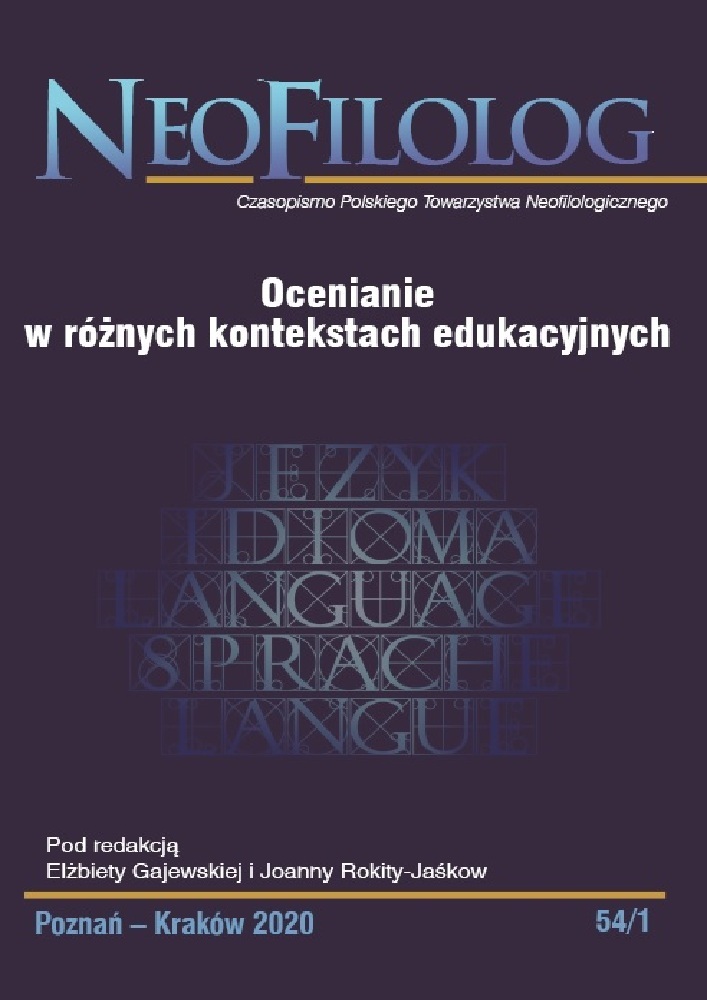Abstract
The article introduces formative assessment as one of the most powerful factors influencing students’ achievements and presents its significance for process-oriented learning and teaching. Due to its importance formative assessment should be an inherent part of the pre-service teacher training program. The aim of the present paper is to highlight the potential of peer-to-peer-feedback, as a part of formative assessment, for enhancing the assessment competence of pre-service teachers. The results of the study presented in the article suggest ways in which peer-to-peer feedback can be used to foster the assessment competence of prospective teachers.
References
Al-Khamisy D. (2013), Edukacja włączająca edukacją dialogu. W poszukiwaniu modelu edukacji dla ucznia ze specjalnymi potrzebami edukacyjnymi. Warszawa: Wydawnictwo Akademii Pedagogiki Specjalnej.
Bohl T. (2004), Prüfen und Bewerten im Offenen Unterricht. Weinheim und Basel: Beltz Verlag.
Bortz J., Döring N. (2003), Forschungsmethoden und Evaluation für Human- und Sozialwissenschaftler. Berlin – Heidelberg – New York: Springer.
Czaplikowska R., Kubacki D. (2019), Kleines Fachlexikon der DaF-Didaktik. Theorie und Unterrichtspraxis. Chrzanów, Kraków: Kubart.
Hattie J. (2015), Widoczne uczenie się dla nauczycieli. Jak maksymalizować siłę oddziaływania na uczenie się. Warszawa: Centrum Edukacji Obywatelskiej.
Hattie J., Timperley H. (2007), The power of feedback. „Review of Educational Research”, Nr. 1(77), S. 81–112. Online: https://ctl.univie.ac.at/fileadmin/user_upload/z_ctl/Feedback/Hattie_Timperley_2007_Power_of_Feedback_1_.pdf [abgerufen am 18.03.2017].
Janicka M. (2017), Umgang mit Diversität im Klassenraum – Annahmen und Realität. „Glottodidactica”, Vol. XLIV/1(2017), S. 9–21.
Janicka M. (2016), Nauczyciele języków obcych wobec różnorodności w klasie językowej oraz wyzwań dydaktyki włączającej. „Języki Obce w Szkole”, Nr 4, S. 39–46.
Komorowska H. (2018), Feedback in language learning and teaching. „Glottodidactica”, Vol. XLV/2(2018), S. 185–199.
Kordziński J. (2013), Nauczyciel, trener, coach. Warszawa: ABC. Wolters Kluwer Business.
Reich K. (2004), Konstruktivistische Didaktik. Lehren und Lernen aus interaktio¬nistischer Sicht. München, Unterschleißheim: Luchterhand.
Reich K. (2014), Inklusive Didaktik. Bausteine für eine inklusive Schule. Weinheim und Basel: Beltz Verlag.
Siebert H. (2005), Pädagogischer Konstruktivismus. Lernzentrierte Pädagogik in Schule und Erwachsenenbildung. Weinheim und Basel: Beltz Verlag.
Sterna D. (2016), Uczę się uczyć. Ocenianie kształtujące w praktyce. Warszawa: Centrum Edukacji Obywatelskiej.
Ziebell B. (2007), Unterrichtsbeobachtung und Lehrerverhalten. Fernstudieneinheit 32. Videosequenzen. Berlin: Langenscheidt.
INTERNETQUELLEN
http://prawo.sejm.gov.pl/isap.nsf/download.xsp/WDU20120000131/O/D20120131.pdf [abgerufen am 08.10.2019]
http://isap.sejm.gov.pl/isap.nsf/download.xsp/WDU20190001450/O/D20191450.pdf [abgerufen am 08.10.2019]
License
Copyright (c) 2020 Monika Janicka

This work is licensed under a Creative Commons Attribution-NoDerivatives 4.0 International License.
Authors
Authors of texts accepted for publication in Neofilolog are required to complete, sign and return to the Editorial team’s office the Agreement for granting a royalty-free license to works with a commitment to grant a CC sub-license.
Under the agreement, the authors of the texts published in Neofilolog grant Adam Mickiewicz University in Poznań a non-exclusive, royalty-free license and authorize the use of Attribution-NoDerivatives 4.0 International (CC BY-ND 4.0) Creative Commons sub-license.
The authors retain the right to the free disposal of the work.
Users
Interested Internet users are entitled to use works that have been published in Neofilolog since 2017, under the following conditions:
▪ attribution – obligation to provide, together with the distributed work, information about the authorship, title, source (link to the original work, DOI) and the license itself.
▪ no derivatives – the work must be preserved in its original form. Without the author's consent, it is not possible to distribute the modified work in the form of translations, publications, etc.
Copyrights are reserved for all texts published since 2017.
Miscellaneous
Adam Mickiewicz University in Poznań retains the property right as a whole (layout, graphic form, title, cover design, logo etc.).

